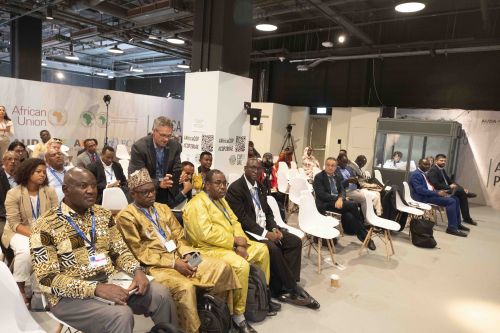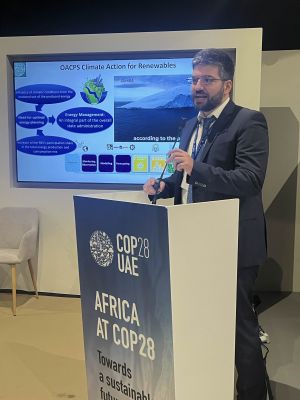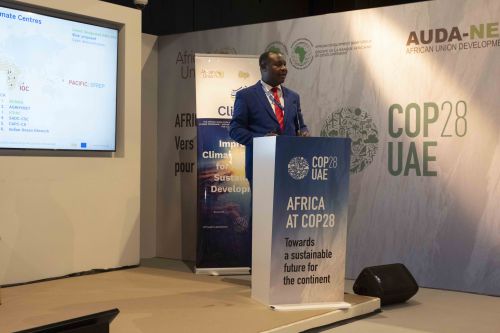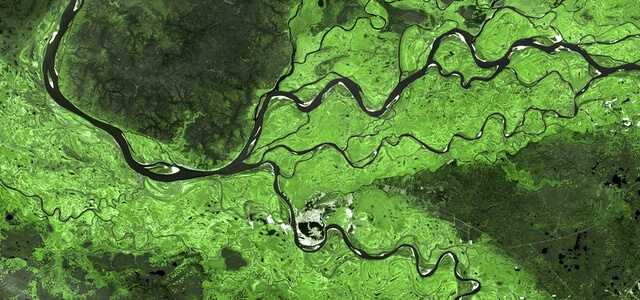An impactful side event took place on 06 December 2023, organised by the Organization of the ACP States (OACPS), the African Union Commission (AUC), the Indian Ocean Commission (IOC), the National Observatory of Athens (NOA), and key African regional climate centres (RCCs). Under the EU-ACP partnership, the OACPS Secretariat has initiated the intra-ACP Climate Services and Related Applications Programme (ClimSA) to address the impacts of climate change on socio-economic sectors.
ClimSA aimed to enhance the capacity of decision-makers at all levels to bridge the gap between climate science and policy, facilitating the improved mainstreaming of climate services into regional and national policy processes. This collaborative effort aimed to emphasize the importance of advanced climate services in facilitating knowledge-driven decision-making processes for sustainable development in African regions.
The event brought together a coalition of organisations, including the OACPS Secretariat, the European Union, the IGAD Climate Prediction and Applications Center (ICPAC), West Africa and Sahel Regional Climate Center (AGRHYMET RCC WAS), African Center for Meteorology Applications for Development (ACMAD), the SADC Climate Service Center (SADC-CSC), and the Climate and Application Center for Central Africa (CAPC-AC).

Dieudonne Faka – Team leader of the ClimSA Programme - emphasized the need for African Caribbean and Pacific RCCs to be linked, support each other, and provide innovative solutions and services to users at all levels and in all sectors.
DG Andre Kamga of ACMAD stressed the importance of investing in infrastructure resilience through the development of climate services such as the impact of high temperatures, extreme event return period and heatwaves in the future climate to ensure effective impact information is anticipated in warnings and forecasts.
Despite scientists' efforts to accumulate evidence for anthropogenic climate change, the slow reaction of policymakers prompted the need for an interface platform between climate science and policy. OACPS Secretariat, in collaboration with RCCs and technical partners, are working to develop tools for mainstreaming climate into policies and strategies.

Dr. Hussen Seid of ICPAC highlighted the critical role of shared experiences on recent extreme events, emphasizing the invaluable climate services and user-relevant products provided by ICPAC for early warning and decision-making in the agriculture sector and food security.
Dr. Panagiotis ClimSA Expert from the National Observatory of Athens (NOA) launched a prototype of Climate Service for Sub-Saharan Africa, underlining the importance of developing renewable energy plans and management schemes. He suggested this prototype could be easily replicated in the Caribbean and Pacific regions. Thus, the event further showcased the flexibility of adapting climate services to different regions in the climate-sensitive sectors. It demonstrated and promoted the usefulness of climate services for intelligent energy management.

The main output of the side event focused on raising awareness among decision-makers at all levels about enhancing climate-informed decision-making and bridging the gap between climate science and policy for improved mainstreaming of climate services in ACP regions. The event showcased existing climate services for energy systems and other sectors, demonstrating the utility and efficiency of applying climate services to support sustainable development.
Both experts and decision-makers attending the side event demonstrated increased interest in the effectiveness of climate services for sensitive socio-economic sectors. They committed together to build the science – policy interface for mainstreaming climate into policy and strategies.

